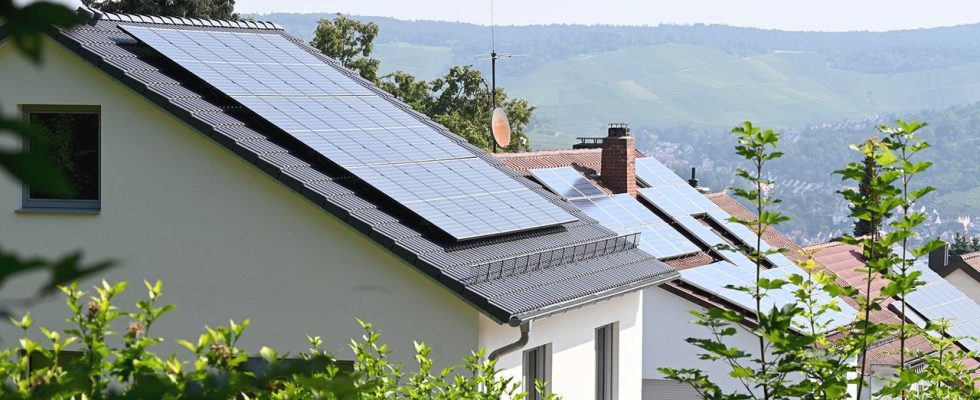Does the German solar industry need government support in order to be able to assert itself against Chinese market dominance? There will probably not be a so-called resilience bonus – the traffic light is stuck.
Gunter Erfurt is the head of the solar manufacturer Meyer Burger. He once ran to revive the German solar industry – especially against Chinese competition. But the solar manager is now convinced that it won’t work without government support. The massively supported Chinese competition, which has an estimated market share of 80 to 90 percent in Germany, is too overpowering.
The Meyer Burger boss complains about unequal competitive conditions. “Meyer Burger is certainly the company that communicated the most clearly on this point,” said Erfurt ARD lunchtime magazine. “But it affects the entire local solar industry. This will lead to thousands of job losses, especially in eastern Germany.”
Thinking about moving to the USA
A Meyer Burger factory is currently at a standstill. Solar modules have so far been manufactured in Freiberg, Saxony, and around 500 employees fear that their factory will be closed completely. Manager Erfurt is threatening to move to the USA, where the state is currently trying to attract industrial companies with subsidies and tax credits – especially in sectors related to the energy transition.
In view of the subsidy competition and low-cost Chinese competition, Economics Minister Robert Habeck is fundamentally in favor of state support for German solar system manufacturers: “If we want to keep them here, we have to create some kind of condition that outweighs that,” said the Green politician. Creating conditions means spending money. “And that’s why all the talk about ‘no subsidies’ is worthless when it becomes concrete.”
Controversial topic of subsidies
Specifically, it is currently about the so-called Solar Package 1. This should above all ensure that photovoltaic systems in Germany can be installed more quickly and with less bureaucracy. For example, balcony systems or solar parks on agricultural land. There is hardly any dispute about this within the traffic light coalition. But about possible subsidies, we got stuck.
Parts of the solar industry are calling for a so-called resilience bonus to be anchored in the solar package. This means: Operators of photovoltaic systems should receive separate funding if they use a certain proportion of German or European components. This is intended to reduce dependence on China. The state would have to pay for this subsidy through the Renewable Energy Act.
The FDP is resisting this within the traffic light coalition. Finance Minister Christian Lindner said yesterday Report from Berlin: “If I were to use taxpayers’ money to support individual sectors or individual companies – then that would have no impact on the resilience of Germany as a location, i.e. our economic security, or on the success of the energy transition. It is simply for the sake of… Advantage of individual interested parties.”
FDP against new funding
“Germany must become more competitive,” emphasizes FDP parliamentary group leader Christian Dürr. “But the answer to competitiveness problems cannot simply be new subsidies. Previous governments have shown that: That didn’t work.”
Dürr is referring to the first major crisis in the German solar industry. A good 20 years ago, German manufacturers experienced a boom. You benefit from the fact that the buyers and operators of solar systems received generous support through the feed-in tariff from the EEG levy. The expansion progressed quickly – albeit at high costs.
Industry not closed for resilience bonus
The situation then changed in the 2010s. The federal government reduced funding for solar expansion, which is why demand initially collapsed. At the same time, Chinese competition entered the market with significantly cheaper solar modules. The buyers of the panels opted for products from China – and German companies went bankrupt in droves.
Now, around ten years later, one thing is remarkable: the solar industry is not fighting as a unit for the resilience bonus or subsidies for German manufacturers. Some companies such as “Energiekonzepte Deutschland GmbH” warn of market distortions. These companies earn their money in particular by installing photovoltaic systems. The cheap investments from China are very convenient for you.
Around 115,000 employees
One thing is clear: the expansion of photovoltaic systems is currently experiencing a new boom. According to the Federal Network Agency, almost twice as much capacity was added last year as in 2022. Legal relief for large solar parks contributed to this. And also the prices for PV systems. If solar modules are manufactured in China at subsidized dumping prices, this will probably also have the effect that the local energy transition will make faster progress.
According to the German Solar Industry Association, the German photovoltaic industry currently has around 115,000 employees – the vast majority of whom work in trade, crafts and the operation of solar parks. Only five to ten percent of employees work in the production of PV systems.
Bonus probably won’t come
A central question for the traffic light parties is now: Do politicians consider the solar industry to be so strategically important that they want to support local manufacturers with subsidies?
Chancellor Olaf Scholz seems to be rather skeptical. The SPD politician emphasized this week that renewable energies would have to assert themselves more on the market and get by with less funding.
We hear from coalition circles that the resilience bonus probably won’t come. Saxony-Anhalt’s Prime Minister Reiner Haseloff calls this in Report from Berlin a drama. For solar energy production, this means “that the energy transition will not be secured from Germany, but rather from the Chinese in terms of materials.”
It is unclear whether the coalition wants to support German manufacturers in other ways. Either way – the industry is hoping for a decision soon.
Martin Polansky, ARD Berlin, tagesschau, March 22, 2024 4:53 p.m

